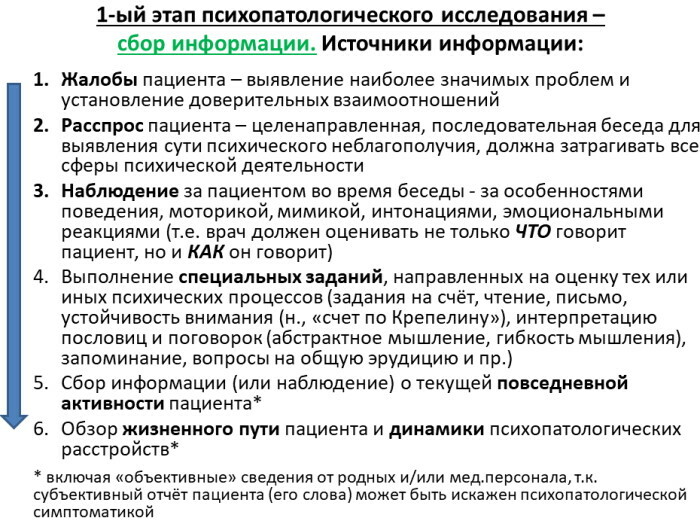Content
- Definition
- Why do you need
- Structure
- Methods and methods
- Conversation
- Story
- Questioning
- Document analysis
- Anamnesis video
Anamnesis in psychology is a collection of data about a client that a specialist receives in the course of various research methods. Translated from Greek, the term is translated as "memory". Initially, the concept was used in medicine, but later it began to be applied in related fields of science.
Definition
Anamnesis in psychology is a concept that was considered by such psychologists as N. I AM. Semago, I. AND. Mamaichuk, A. L. Wenger, G. A. Zuckerman. Z. Freud and J. Breuer described the definition as recalling past events that influenced neurotic manifestations in the present.
B.V. Zeigarnik, a representative of the Russian school of psychology, defined the term as information characterizing a "longitudinal section" of a person's life path. D.B. Elkonin called the history of the life and development of a child or an adult as an anamnesis.
V. Myasishchev believed that anamnesis as the history of a person's life is the main method of research and study of personality. M.A. Kotik noted that the anamnestic method is similar to the biographical method, since it connects the events taking place with previous events.
S.L. Rubintstein pointed out that anamnesis in psychology is based on the principle of determinism. According to him, in the study of personality, it is necessary to rely on the fact that external events are always mediated by internal processes. In other words, any external influence and effect from it depends on the history of the person and his internal characteristics.
L.S. Vygotsky viewed the collection of anamnesis data not as a one-sided subjective, but as a dynamic process. In the course of obtaining data, the psychologist took into account heredity, intrauterine development, environmental conditions and human upbringing.
S.N. Kostromin and A.F. Anufriev identified 2 types of psychological history:
- Objective - data that is received about the persons who followed the life and growth of the client from the outside. These are parents, friends, relatives, neighbors, teachers, colleagues.
- Subjective - information that the subject himself told about himself.
 V.N. Myasishchev and E.P. Feoktistov proposed a system of forms of communication between external and internal factors that affect the formation of personality.
V.N. Myasishchev and E.P. Feoktistov proposed a system of forms of communication between external and internal factors that affect the formation of personality.
| Contact form | Description |
| Accumulation | An event in which some external conditions influence the development of any specific properties. For example, egocentrism arises simultaneously from several factors: the composition of the family, the presence of siblings, the style of upbringing, the style of communication of persons of higher status, place in a social group. |
| Subordination | A situation in which one property becomes dominant and affects the appearance of several other external conditions. Together they form a specific feature of a person. For example, alcoholism of parents provokes the emergence of material difficulties, disinterest in the child, and the unhappiness of the intra-family climate. Subordination here is a possible antisocial behavior. |
| Antagonistic connection | An event due to which external conditions negatively affect the emergence and development of personality traits. For example, too much extracurricular activities reduce the amount of time a child spends with the family. This leads to problems in the psycho-emotional state. |

 V.V. Kovalev identified several types of anamnesis:
V.V. Kovalev identified several types of anamnesis:
- Family - used to collect data on family history, situation, relationships, role positions in the family, educational attitudes.
- Private - includes information about the development and formation of a person's personality traits, including how the person himself assesses his mental states.
- Active - information about the characteristics of the leading activity (of particular importance) of a person at this stage of development.
Why do you need
Anamnesis in psychology is information about a person and his condition, recorded from his words, as well as found out during a survey. The information collected during the anamnesis includes general data about a person, his formation as a person. In the process of obtaining information, you need to pay attention to important milestones in the client's life, living conditions, social environment, family upbringing style, relationships outside the family.
The main task of the method is to clarify the individual psychological characteristics of a person. Anamnesis is needed to make the initial diagnosis, to form an understanding of the causes and mechanisms of the symptoms with which the patient came or was referred to a specialist.
Obtaining data in psychology is considered as the initial stage of the process of psychodiagnostics. In the course of the anamnesis, the interaction between the client and the consultant arises, the contact unfolds. The main role of anamnesis is manifested at the stage of putting forward hypotheses about the client's condition.
The revealed information allows you to confirm or refute the assumptions about the initial causes of the mental formations of the personality. The method makes it possible to understand what exactly determined the way of human development, what events in the child's life and to what extent influenced the change in the psyche.
In clinical psychology, anamnesis is used to make a correct diagnosis and to prescribe an appropriate treatment. Correctly conducted collection of information provides information about the cause of the onset of the disease, the characteristics of its course, the emotional and physical state of the patient.
The value of anamnesis in psychology lies in the fact that in its course the genetic method of studying the facts of the psyche is realized. According to him, any mental phenomenon is seen as a process in which the psychologist tries to restore all the moments of development, the change of stages. That is, this fact makes it possible to consider a specific event in a specific history.
Structure
Anamnesis in psychology is information about a client that is collected according to a certain scheme. The survey structure is used in its original form or is adapted by the psychologist specifically to each case. The diagram reflects important events in the client's life, the time the problem appeared and the condition deteriorated. The data obtained facilitate the work of the psychologist in the counseling process.
MM. Semago and N. Ya. Semago wrote that during the anamnesis, the psychologist should pay attention to the main stages of development, which reflect the peculiarities of the opening of the psyche. They are called key points. These are the most important and defining moments of the formation of the psyche, during which the basic mental formations change qualitatively.
These include periods:
- 2.5-3 months;
- 7-8 months;
- 1 year;
- 18-24 months;
- 2.5-3 years;
- 5.5-6.5 years old;
- 9-10 years old.
The standard outline of a psychological history is as follows:
- Demographic data:
- age;
- marital status;
- education;
- profession.
- Current violations and problems:
- the appearance, development and duration of difficulties;
- events in life that appeared with the emergence, exacerbation and resolution of difficulties;
- the age when the problems appeared;
- a change in attitude towards significant people, a change in interests, a deterioration in sleep and appetite due to the appearance of difficulties;
- the reason for contacting a psychologist and the client's request;
- attempts to solve the problem on their own or with the help of other specialists;
- the use of medicines;
- information about the family (alcoholism, mental illness, suicide, drug addiction).

- Psychosocial history (collection of information about interpersonal relationships):
- early childhood (circumstances, order of birth, parents, family relationships);
- preschool childhood (having sisters and brothers, significant family situations, first memories);
- early school period (academic performance, problems with peers and teachers, family relationships);
- adolescence and adolescence (relationships with friends and peers, parents, people of the opposite sex, academic performance, aspirations);
- adulthood (relationships in society, satisfaction with marriage and work, family relationships, sex life, loss of significant people, economic conditions of life, age-related changes, the use of drugs and alcoholic substances, psychological crises, plans for future).
The content and amount of information obtained during the history is determined by the tasks of diagnosis, the therapist's attitudes, and the approach in which the psychologist works. For example, A. Adler and his followers believed that a person's life style was influenced by the order of birth in the family.
According to the psychologist, the sequence of birth is important, since it is associated with the formation of the main attitudes of the personality. Older children are usually characterized by a sense of responsibility that arises in helping parents look after younger sisters and brothers. These children are prone to order, stability, conservatism.
Second children are prone to sibling trauma from birth - rivalry with an older brother or sister. Due to the age difference on the part of the younger, a more successful competitor is constantly present. Therefore, these children are ambitious, they know how to compete, they are constantly looking for new things to do.
Younger children are surrounded by universal love from childhood. Despite the favorable situation, this situation contributes to the formation of a constant hope for the love and indulgence of the environment.
The only child gets all the attention of the parents. He has a lot of social contacts, but little communication experience. Such children are often spoiled, they expect the world to do everything for them, but then they are disappointed and become hostile.
T. Leary suggested a different structure of the anamnesis based on in-depth analysis:
- information about behavior in society;
- information about self-esteem;
- data obtained during testing by thematic apperception test and dream analysis;
- information about the unconscious;
- information about the value system of the individual.
Methods and methods
Anamnesis is information about the retrospective properties of the subject, the conditions for the formation and development of personality in psychology. The main task of the psychologist is to establish the events that influenced the path of the formation of the psyche, that is, the significant factors in the life of the child.
In the psychological history, various conversational and documentary methods are used. They help to better understand a person's problem and understand its origins. The information obtained in the course of communication is analyzed, and then unresolved problems are highlighted. They try to disassemble them using such methods as observation, experiment, analysis of the products of activity.

In the course of collecting information, it is necessary to work with available information that can be subjected to a meaningful interpretation by a psychologist, and also correspond to the professional competence of a specialist.
Conversation
The main data of the anamnesis are obtained during the conversation. It is carried out in free form or in the form of answers to questions. Each psychologist has his own indicative survey pattern, which should be flexible and variable. The course of the conversation depends on the client's answers to the therapist's questions.
For a successful move, you must comply with the following conditions:
- Preparedness. The psychologist asks only prepared and thoughtful questions. Their form and content are determined by the tasks, position and age of the respondent. In the course of the conversation, the questions change, transform and supplement depending on the client's answers.
- Ease, lively conversation. The conversation should take place in a friendly, trusting and sincere atmosphere that does not disturb the client. This is especially important when collecting information subjectively.
- The conversation should follow the pattern. The psychologist should use a ready-made or self-prepared structure of the conversation. This is usually an indicative chart that changes depending on the answers to the questions.
- When talking, it is necessary to take into account the individual psychological characteristics of the client.
- The answers are recorded using audio recording or the introduction of a protocol. Sometimes this is done after the end of the dialogue.
Different psychologists can extract different information from the conversation.
The discrepancy occurs for several reasons:
- Various ways of interviewing a client.
- The influence of the therapist's personality on the client.
- Fixing different manifestations in the behavior of the respondent.
- The difference in the interpretation of the information received.

In the psychological history, the conversation and conversational techniques are preceded by test and projective diagnostic methods.
Story
A free story of a person about himself and the problem he faced, makes it possible to open up, manifest. From the data obtained, the psychologist draws conclusions about the personality traits, attitude to the problem, approaches the formation of the request.
Questioning
It is used to obtain information that the client does not notice or ignores in the story. This method makes it possible to highlight precisely meaningful information for making a diagnosis.
Document analysis
Expands the survey database, is a repository of objective information about the client.
In addition to conversational techniques, there are many different ways to collect information:
- observation of behavior, characteristics of reaction to stimuli, non-verbal manifestations;
- examining the records of other specialists who sent a person for consultation;
- psychodiagnostic methods.

To carry out psychodiagnostics within the anamnesis use:
- tests of intelligence, abilities, cognitive sphere;
- personality tests to identify different areas - motivational, emotional-volitional, characteristics of temperament, character, self-esteem, level of social interest;
- situational techniques for determining the current state of the subject;
- projective tests - drawing techniques, essays, dream analysis.
Anamnesis is information about a person's life and development, which is obtained during a conversation or various psychological tests. The information obtained is used to better understand the origins of the human problem. A correctly collected anamnesis helps to resolve the exciting situation for the client, to improve his emotional state.
Anamnesis video
Collection of complaints and anamnesis in psychiatry:



